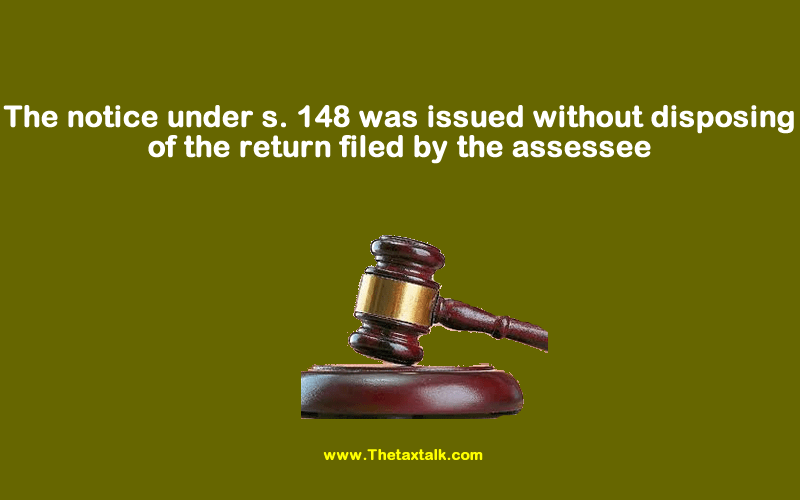![]()
The notice under s. 148 was issued without disposing of the return filed by the assessee
KAMALJEET vs. ASSISTANT COMMISSIONER OF INCOME TAX
ITAT, DELHI ‘SMC-II’ BENCH K.C. Singhal, J.M. ITA Nos. 3610, 3863/Del/1998
14th February, 2003
(2003) 22 CCH 0089 DelTrib
(2004) 1 SOT 0310
Legislation Referred to
Section 148, 153
Case pertains to
Asst. Year 1993-94
Decision in favour of:
Assessee
Reassessment—Notice under s. 148—Validity and time limit—Return filed by assessee on 28th Jan., 1994 and notice under s. 148 issued by AO on 28th Sept., 1994 without disposing of the return was invalid—Further, assessment completed on 25th March, 1997 was also barred by limitation under s. 153
Held:
In the present case, the notice under s. 148 was issued without disposing of the return filed by the assessee. Notice under s. 148 was illegal.—Trustees of H.E.H. The Nizams Supplemental Family Trust vs. CIT (2000) 159 CTR (SC) 114 : (2000) 242 ITR 381 (SC) and CIT vs. Ranchhoddas Karsondas (1959) 36 ITR 569 (SC) followed.
(Para 3)
The provisions of s. 153 clearly provides that assessment on the basis of return could be completed either within two years from the end of assessment year or one year from the end of financial year in which the return was filed. On the basis of the facts on record, the assessment could be completed by 31st March, 1996. Since the assessment was completed on 25th March, 1997, the assessment was illegal, being time-barred. Consequently, the order of CIT(A) is set aside and the assessment framed by the AO is hereby quashed.
(Para 4)
Conclusion:
Notice issued under s. 148 on 28th Jan., 1994, without disposing of the return was invalid and assessment made on 25th March, 1997 was also barred by limitation under s. 153.
In favour of:
Assessee
Counsel appeared:
K.R. Manjani, for the Appellant : S. Bhattacharya, for the Respondent
ORDER
K.C. SINGHAL, J.M. :
ORDER
These are the cross-appeals filed by the assessee as well as revenue and the same are being disposed of by the common order for the sake of convenience.
- First we take up the appeal of the assessee. The main ground of the assessee is that the proceedings under s. 147 were illegal and void ab initio. At the outset, it has been pointed out by the learned counsel for the assessee Mr. Manjani that the return of income for asst. yr. 1993-94 was filed by the assessee voluntarily on 28th Jan., 1994 under acknowledgement receipt No. 2840. However, without making any assessment on the basis of such return, the AO issued notice under s. 148 on 28th Sept., 1994. On the basis of these facts, it was strongly contended that during the pendency of the assessment proceedings, it could not be said that income of the assessee had escaped assessment. To support his contention, he relied on various decisions of the Supreme Court, namely, Trustees of H.E.H. The Nizams Supplemental Family Trust vs. CIT (2000) 159 CTR (SC) 114 : (2000) 242 ITR 381 (SC) and in the case of CIT vs. Ranchhoddas Karsondas (1959) 36 ITR 569 (SC). Faced with the situation, the learned Departmental Representative has nothing to add except to rely on the orders of lower authorities.
- After considering the rival submission, I find substantial merit in the legal contention raised by the learned counsel for the assessee since such contention is fully substantiated by the decision of Supreme Court relied on by him. In the present case, the notice under s. 148 was issued without disposing of the return filed by the assessee. Respectfully following the Supreme Court judgment, it is held that notice under s. 148 was illegal.
- At this stage, it was pointed out from the Bench that if the notice under
s. 148 is excluded, even then the AO could frame the assessment on the basis of return filed by the assessee. In response to such query, it was submitted by him that the assessment was time-barred since the assessment on the basis of return could be made by 31st March, 1996 under s. 153. Since the impugned assessment order was passed on 25th March, 1997, it was time-barred and, therefore, liable to be set aside/cancelled. I find merit in the Explanation of the assessee. The provisions of s. 153 clearly provides that assessment on the basis of return could be completed either within two years from the end of assessment year or one year from the end of financial year in which the return was filed. On the basis of the facts on record, the assessment could be completed by 31st March, 1996.
Since the assessment was completed on 25th March, 1997, the assessment was illegal, being time-barred. Consequently, the order of CIT(A) is set aside and the assessment framed by the AO is hereby quashed.
- In view of the above discussion, the Departmental appeal does not survive. Therefore, the same is dismissed as infructuous.
- In the result, appeal of the assessee is allowed whereas the Departmental appeal is dismissed.

